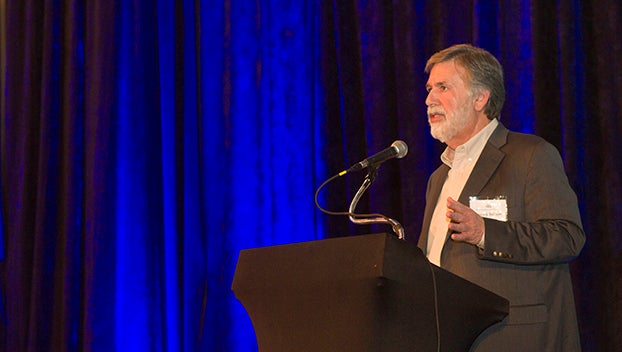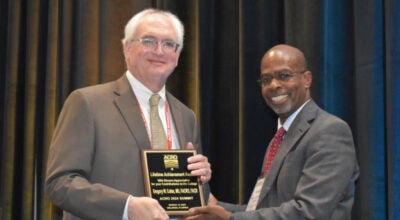Local journalist, retired Millsaps professor honored at NLCC
Published 12:50 am Sunday, February 26, 2017

- Stanley Nelson was one of the recepients of the Richard Wright Award for Literary Excellence. (Cain Madden / The Natchez Democrat)
NATCHEZ — Upon receiving a Richard Wright Award for Literary Excellence, a Concordia Parish journalist juxtaposed one of the late author’s 1938 works with the 1960s Civil Rights violence.
Concordia Sentinel Editor Stanley Nelson, who wrote “Devils Walking: Klan Murders along the Mississippi in the 1960s,” was honored Saturday along with Peggy Prenshaw, retired Millsaps College professor and author of “Conversations with Eudora Welty.”
Nelson said when he was in college at Louisiana Tech University, one of the first short stories he read in English literature was “Fire and Cloud” by Richard Wright.
With Nelson’s experiences tracking down former Klansmen over the past 10 years, he said the story resonates with him even today. In Wright’s story, a preacher — the Rev. Taylor — trying to find a way to feed his poor congregation, considers a communist party march.
The mayor and police chief threaten the preacher to not march, and the preacher tells them he is going to do what his people feel like should be done.
As a consequence, a dark colored car later pulls up and the preacher goes outside to find a Ku Klux Klan wrecking crew. The reverend is thrown in the back of a car and taken to a remote place and whipped.
Nelson said such scenes were happening along the Mississippi River counties and parishes 30 years after Wright wrote about it.
Two murders Nelson mentioned were the deaths of Henry Dee and Charles Moore, who died in May 1964. Dee and Moore were taken into the woods, beaten with bean sticks, and then later thrown in the back truck of the car and taken to the Mississippi River. The pair, still alive, were bound, gagged, tied with weights and thrown into the river to drown.
“In Richard Wright’s short story, you feel what Rev. Taylor was going through,” Nelson said. “You are thrown in the back of a car, on the floorboard. You don’t know where you are going, but you know where you are going, something terrible is probably going to happen to you.”
Nelson said this project of looking into cold cases and Klan murders has also netted some positives. Nelson said he has witnessed healing, through the family of victims showing forgiveness, such as Thomas Moore, the brother of Charles Moore, forgiving one of the Klansmen involved.
“That changes the lives of two people,” Nelson said. “It begins to reverse a lack of acknowledgement and understanding we have not had for many years.
“We stand at a great time for reconciliation. Forgiveness is a good start.”
Prenshaw spoke about the importance of autobiographies and also how far along women’s rights have come.
Two stories from Lindy Boggs bookended a portion of the fight. Boggs was the wife of Thomas Hale Boggs, former U.S. House of Representatives majority leader and she also went on to serve in the House when her husband died.
Before Hale Boggs died, he had asked Lindy Boggs to come to a hearing. Prenshaw said Hale Boggs often used Lindy Boggs as a sounding board because she had good political sense.
Later in life, after Boggs had been part of passing the Equal Opportunities Act of 1974, she made sure to include sex and marital status in the act as aspects protected from discrimination.
When Boggs went to a bank to buy a condo in the Washington, D.C., area, the lady with the bank wanted a male cosigner such as a brother or son with Boggs’ husband deceased. Prenshaw said Boggs told the banker she was in violation of the law, and with her steel magnolia smile, said, “I know you are in violation of the law because I wrote it.”
For autobiographies, one example was Eudora Welty’s “One Writer’s Beginnings,” Prenshaw said Welty was in her 80s writing about young Eudora. Welty was trying to fashion her text in a way that is coherent, alive and vibrant, through a lens in the present, Prenshaw said.
“I think autobiographies are a fascinating genre for everyone to enjoy,” Prenshaw said. “I think the lesson is, live in the moment. Be aware that you are making a life, hopefully are making memories you can fashion in a way that engages the person who hears your story.”





